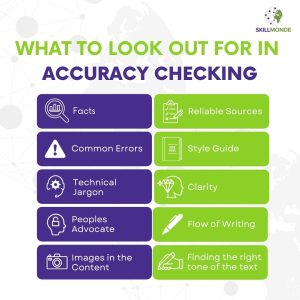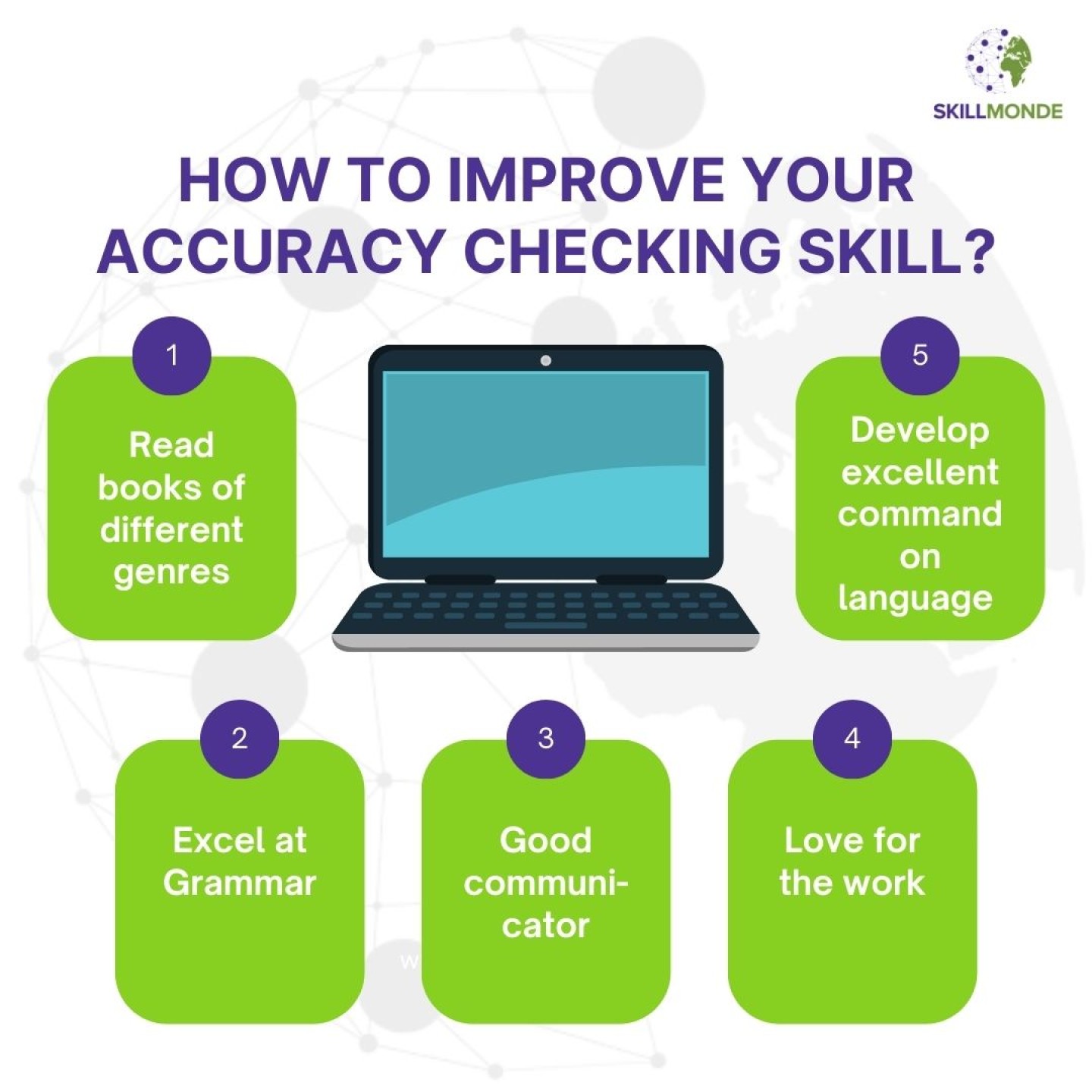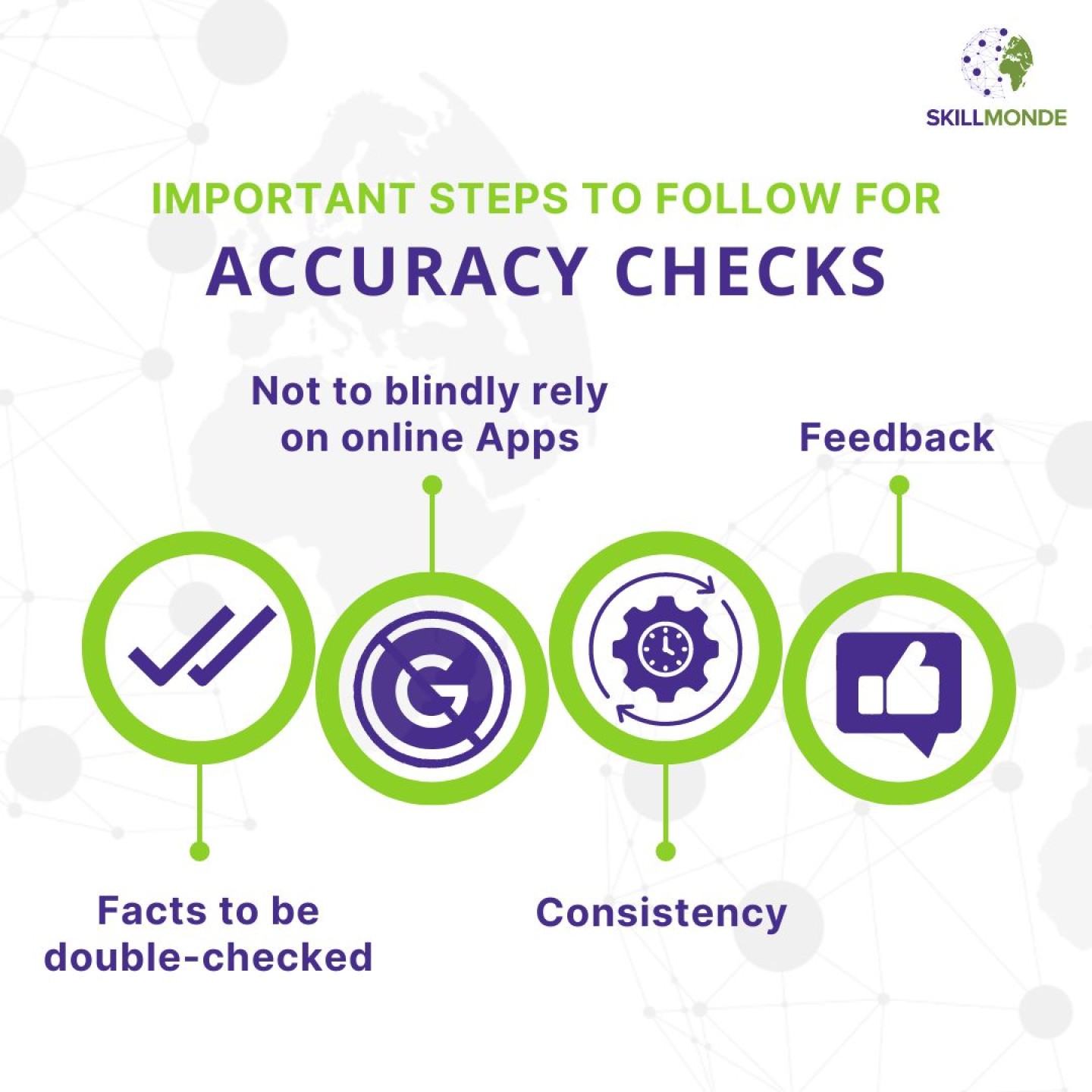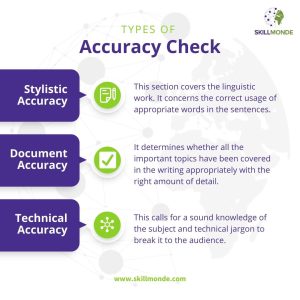Accuracy check in Proofreading is a quintessential part of the writing business. Publication Industries hire professional proofreaders to proofread the edited text before putting it to print. Proofreading concerns the process of examining an edited version of a script for any errors and maintaining accuracy and consistency in writing. Proofreaders should have an eye for spotting errors.
Editing includes accuracy checking as well as proofreading. It is important to mention that editing is not the same as proofreading while they are frequently assumed to be similar. The publication process comprises writing, editing, proofreading, and publishing. Accuracy checks are carried out in both the editing and proofreading stages.
Readers lose their interest in the content after spotting errors, and incorrect information and facts. The article then loses its credibility, authenticity, and integrity. There is no place for blunders in this digital world where anyone can cross-check your work for genuineness. It is therefore best to proofread your work or hire someone to proofread to avoid inconvenience later.
The accuracy check that has been carried out in the editing part is again covered by proofreaders. This is to cross-check the facts and look for simulations, mistakes in punctuation, spelling, grammar, and language without losing the idea of the writer. This is intended to strengthen public relations with the writer.

WHAT TO LOOK OUT FOR IN ACCURACY CHECKING
Tips to check accuracy in proofreading
Points to remember while doing accuracy check in proofreading are-
- Facts: While proofreading, make sure not to slip by any facts without cross-checking. Verification of names, places, organizations, quotations, figures, numbers, and dates is mandatory in checking for accuracy.
- Reliable sources: The sources from where double-checking the facts is being done also matter. The sources must be genuine and authentic with correct figures, numbers, and data. Corroboration is a must for the validation of your text.
- Common errors: Many common linguistic errors are detected in writing that the writers subconsciously forget to mind. Proofreaders save writer from mishaps and avoid being in an awkward position among his peers. For example, the usage of “your” and “you’re”.
- Style Guide: The writing has to be consistent throughout with a particular style guide of writing. Proofreaders have to be in understanding with the publishing houses to properly guide the writing. Credibility as a proofreader is precious in this business.
- Technical Jargon: It is equally important to break down the technical terminologies and simplify them where applicable and check their accuracy, targeting a bigger audience. It is best to communicate with the writer and take his opinion.
- Clarity: Communication between writers and proofreaders is important to understand the mind of the writer. A proofreader and the writer have to be on the same page to deliver the writer’s message correctly.
- People’s advocate: A good proofreader will know the interest of the general mass and accordingly make the content presentable to the audience with accurate facts and figures. Preference is effective communication over everything else.
- Flow of the writing: This is an essential part of the job. Writing has to be logically followed. People lose interest in reading an article after finding that the topics covered in the writing are not in the flow and look clumsy. This is due to poor outlining and transitions. It loses the aspect of storytelling.
- Images in the content: Accuracy checking in proofreading also concerns the images used in the text. Images attract more viewers than words. It needs to be checked whether it is making sense with the texts. Images need to be contextual.
- Finding the right tone of the text: Proofreaders match the tone of the writing with the requirement. Whether it is formal writing, business writing, blogs for websites, or writing for job applications, getting the tone right is the principal part of accuracy checking in proofreading.
FAQs
- What does a proofreading accuracy check entail?
- An accuracy check in proofreading entails examining the substance of a written piece to ensure that all facts, numbers, and data are correct and consistent.
- Why is precision crucial in proofreading?
- Since errors in facts, numbers, and statistics can have major repercussions, especially in academic, scientific, or technical writing, accuracy is crucial while proofreading. Inaccurate information can damage the author's and the document's credibility and increase the risk of misunderstandings, legal repercussions, and other problems.
- Which accuracy errors should you be on the lookout for when proofreading?
- Some accuracy problems to check for when proofreading include incorrect or missing data in charts, tables, and graphs, as well as dates, names, titles, addresses, statistics, and quotations.
- What are some helpful tips for checking the accuracy of your proofreading?
- Some tips for effective accuracy checking in proofreading include
Evaluating the veracity of all sources used in the document,
Double-checking important details like names, dates, and numbers,
Using reliable reference materials, and
Asking the opinions of subject matter experts as necessary.
- How can I guarantee the accuracy of my editing?
- To ensure that your proofreading is accurate, you should
Carefully read the material
Use a number of proofreading techniques like reading the text aloud, checking spelling and punctuation
Use of proofreading software
You should take breaks
Avoid rushing through the work
- Who is in charge of making sure that written material is accurate?
- While the writer is ultimately in charge of ensuring that the content of a written document is accurate, the proofreader also has a crucial duty to play in spotting and fixing any errors that the writer might have overlooked.
- What should I do if I find errors in a piece of writing when proofreading it?
- During the proofreading process, you should make a note of any errors you find and alert the author or other pertinent parties, such as the editor or publisher, to them. It can be essential to amend or rescind the document, depending on the seriousness and impact of the errors.
- How to ensure consistent accuracy checking across many documents or projects?
- Establishing and adhering to a set of rules, criteria, or checklists for accuracy checking is important if you want to maintain consistency in accuracy checking across various documents or projects. You should also keep lines of communication open and collaborate with the writer or other project stakeholders. To make sure that language, terminology, and formatting are consistent, you can also employ reference resources or style manuals.
- How much on average can an individual earn in this profession?
- In general, depending on the difficulty and duration of the job, freelance proofreaders can expect to make between Rs.200 and Rs.1,000 each hour. Depending on the type of paper, some proofreaders charge a flat rate per word that can range from Re.1 to Rs.10 per word.


